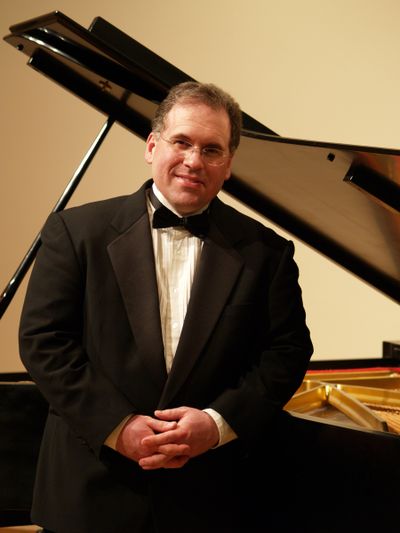Pianist Edstrom might even pull some strings

Brent Edstrom is a nationally known jazz piano master.
He has arranged music for the likes of Freda Payne and Dee Daniels. He’s shared the stage with such artists as John Clayton, Jon Faddis and Ron Carter. He’s filled books of historical transcription.
Locally, Edstrom is known for his work with the Spokane Jazz Orchestra and his own trio. But what audience members will learn at Saturday’s SJO concert is that he’s pretty dang good on the banjo, too.
In addition to playing with the full band, his trio and a solo piece, Edstrom will be plucking strings as well as pounding them.
At some point, he will step away from his piano bench and pick up a banjo, leading a smaller group through Dixieland with accompaniment from trumpet, clarinet, trombone and tuba.
While Edstrom has a background in both jazz and classical piano, the banjo was his first love.
“My dad took me to see a banjo player named Eddie Peabody when I was 5 or 6 years old and it was life-changing,” he said during a telephone interview.
Saturday’s program features arrangements of music by such jazz legends as Cole Porter and Oscar Peterson. The SJO will also premiere an original Edstrom composition in the style of George Russell, using intertwining lines to showcase individual players.
Breaking down to his trio, Edstrom will be joined by Eugene Jablonsky on bass and Rick Westrick on drums, with whom he has worked for nearly 25 years.
During his sole solo number of the night, Edstrom will connect the dots between rags, stride and the swing era.
His own career has been equally diverse. Edstrom has been commissioned to compose arrangements for Clint Eastwood. He was the pianist and musical director for jazz vocalist Payne.
And he was commissioned to convert pop-rock songs to orchestral arrangements played by the Dallas Symphony for its concert with past “American Idol” finalists.
“It’s challenging to take ‘Every Breath You Take’ and transform it for a full orchestra,” Edstrom said.
As a respected jazz scholar, Edstrom’s understanding of music is also evident in his extensive transcriptions of historical jazz recordings that were never written down.
“Most of the great jazz pianists were playing from the knowledge of the tune and chord structure. It’s improvised based on the structure of the tune, so it was rare for jazz musicians to use sheets,” he said.
“Jazz is an oral tradition and like learning any other language, when you listen to the great players, you hear that tradition and the people that influenced them. From Oscar Peterson you hear Art Tatum and Bud Powell and the stride players. But he makes it his own, and that’s part of what I’ll be trying to show.”